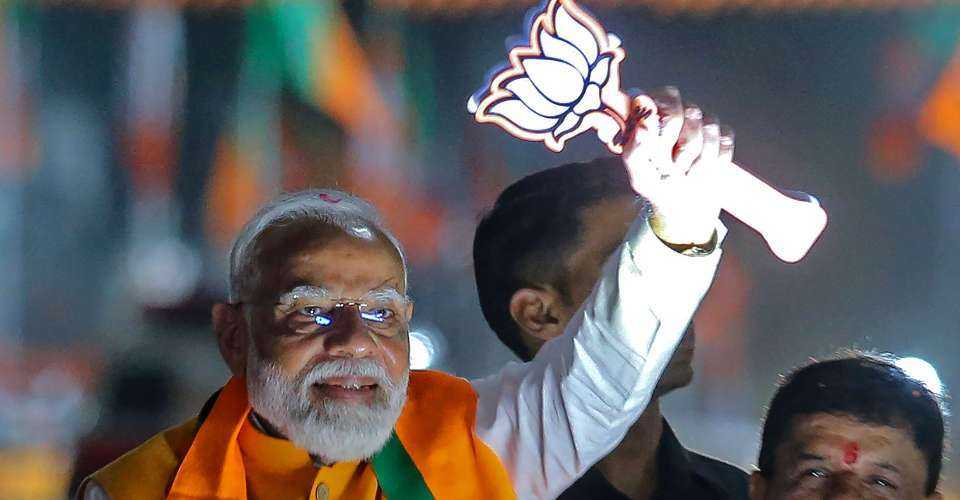
By Nirendra Dev
The heat generated by divisive, hateful speeches during campaigning in the world’s largest election being held in India has compelled the nation’s poll panel to intervene and seek “corrective action or a sort of healing touch” from leaders crossing all boundaries.
Charges and countercharges flew thick and fast between Prime Minister Narendra Modi’s pro-Hindu Bharatiya Janata Party (BJP) and its primary challenger, the Congress party, which swears by secularism.
At the center of the unsavory controversy were the prime minister’s remarks at an election rally in a town in northwestern Rajasthan state. He said the Congress believes “Muslims have the first right to the nation’s assets.”
Modi went a step further in his pitch for votes and warned Hindus that if elected, the Congress would take away their wealth and distribute it among Muslims. “Even gold ornaments of Hindu women will not be safe,” he added.
“Do you think your hard-earned money should be given to infiltrators? Would you accept this?” Modi asked the crowd in Banswaral, a town in the desert state of Rajasthan.
In the course of his speech, the Indian prime minister made apparent references to Muslims as “infiltrators” who “have many children.”
He then went on to repeat the same allegations at an election rally in northern Uttar Pradesh’s Aligarh city, which has a substantial Muslim population.
The Congress leadership reacted strongly, accusing Modi of “hate speech” and violating the model code of conduct for elections that bans canvassing “based on communal lines.”
In its complaint to the poll panel, the Congress party pointed out that Modi’s remarks were “far worse than any ever made by a sitting prime minister in the history of India.”
However, BJP leaders found nothing wrong with Modi’s utterances. The party’s spokesperson told journalists in New Delhi that the prime minister had merely called “a spade a spade,” and his remarks resonated with people’s opinions.
The Congress party’s manifesto is “more for the people of Pakistan and less for the people of India,” alleged Himanta Biswa Sarma, the BJP’s chief minister of northeastern Assam state. “We have interpreted the Congress manifesto in the right way.” Muslim-majority Pakistan is seen as India’s arch-rival.
Another BJP leader and the chief minister of central Madhya Pradesh state, Mohan Yadav, demanded the Congress “apologize to the country.”
The Congress manifesto for the 2024 general election says: “The time has come to reset and reprioritize our roadmap for economic development in the context of the twin challenges to our economy, namely, unemployment and inflation.”
It doesn’t mention anything about wealth distribution among Muslims. However, the reference to “inequality between the rich on the one hand and the poor and middle classes on the other” is being made out by its opponents as “appeasing” the Muslim minority.
Congress leader Abhishek Manu Singhvi said Modi’s “deeply objectionable” statements violated sections of the law that prohibit candidates from asking people to vote on the grounds of religion, community, or religious symbols.
However, Modi continues with his aggressive stance. On April 23, he told another election rally: “Two or three days back, I exposed the Congress, their manifesto, and their politics of Muslim appeasement… This has unnerved them.”
Political observers leaning toward the BJP’s pro-Hindu ideology interpret the promise to eradicate “inequality” as “a body blow to the goals of equality.”
They say the Congress manifesto should not have referred to an independent report, titled “Income and Wealth Inequality in India, 1922-2023: The Rise of the Billionaire Raj” by global economists including Thomas Piketty.
The nation embraced economic liberalization in 1991, which led to a manifold increase in people’s incomes in some sectors, especially in information technology (IT), healthcare, manufacturing, agriculture, and stock markets.
Congress’ promise of addressing growing wealth and income inequality through suitable policy changes “is open to interpretation and even misinterpretation, certainly,” argued political commentator Ramakanto Shanyal from West Bengal.
“It is anybody’s guess that in recent times, the Congress party under Rahul Gandhi has started leaning more towards Marxian ideology,” said political observer Ashutosh Talukdar from Assam.
This duo felt discussing wealth inequality during an election campaign was unwise. The middle class would be irked, and the wealthy corporate houses would leave Congress.
“Modi sensed this and was trying to polarize the electorate, which has always helped him garner more votes,” they explained.
But this hardly explained the crude references to Muslims, who are a sizeable minority, at 14 percent or roughly 200 million of India’s 1.4 billion.
As the Election Commission stated, “Star campaigners are expected to contribute to a higher quality of discourse by providing an all-India perspective, which sometimes gets distorted in the heat of the contests at the local level.”
The poll panel on April 25 sought explanations from both the BJP and Congress and asked leaders like Modi and Gandhi to utilize their privilege for “propagating the program of the political parties.” It also said that “their speeches in the campaign space necessarily need to be judged at a higher threshold of compliance.”
Whether any action will be taken against the “star campaigners” is anybody’s guess, though.
source : uca news
